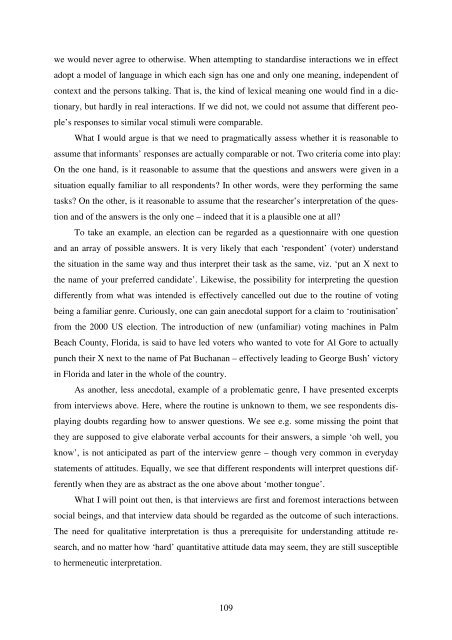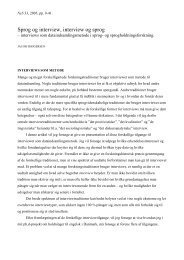Hør dog hvad de siger - Note-to-Self: Trials & Errors
Hør dog hvad de siger - Note-to-Self: Trials & Errors
Hør dog hvad de siger - Note-to-Self: Trials & Errors
Create successful ePaper yourself
Turn your PDF publications into a flip-book with our unique Google optimized e-Paper software.
we would never agree <strong>to</strong> otherwise. When attempting <strong>to</strong> standardise interactions we in effect<br />
adopt a mo<strong>de</strong>l of language in which each sign has one and only one meaning, in<strong>de</strong>pen<strong>de</strong>nt of<br />
context and the persons talking. That is, the kind of lexical meaning one would find in a dic-<br />
tionary, but hardly in real interactions. If we did not, we could not assume that different peo-<br />
ple’s responses <strong>to</strong> similar vocal stimuli were comparable.<br />
What I would argue is that we need <strong>to</strong> pragmatically assess whether it is reasonable <strong>to</strong><br />
assume that informants’ responses are actually comparable or not. Two criteria come in<strong>to</strong> play:<br />
On the one hand, is it reasonable <strong>to</strong> assume that the questions and answers were given in a<br />
situation equally familiar <strong>to</strong> all respon<strong>de</strong>nts? In other words, were they performing the same<br />
tasks? On the other, is it reasonable <strong>to</strong> assume that the researcher’s interpretation of the ques-<br />
tion and of the answers is the only one – in<strong>de</strong>ed that it is a plausible one at all?<br />
To take an example, an election can be regar<strong>de</strong>d as a questionnaire with one question<br />
and an array of possible answers. It is very likely that each ‘respon<strong>de</strong>nt’ (voter) un<strong>de</strong>rstand<br />
the situation in the same way and thus interpret their task as the same, viz. ‘put an X next <strong>to</strong><br />
the name of your preferred candidate’. Likewise, the possibility for interpreting the question<br />
differently from what was inten<strong>de</strong>d is effectively cancelled out due <strong>to</strong> the routine of voting<br />
being a familiar genre. Curiously, one can gain anecdotal support for a claim <strong>to</strong> ‘routinisation’<br />
from the 2000 US election. The introduction of new (unfamiliar) voting machines in Palm<br />
Beach County, Florida, is said <strong>to</strong> have led voters who wanted <strong>to</strong> vote for Al Gore <strong>to</strong> actually<br />
punch their X next <strong>to</strong> the name of Pat Buchanan – effectively leading <strong>to</strong> George Bush’ vic<strong>to</strong>ry<br />
in Florida and later in the whole of the country.<br />
As another, less anecdotal, example of a problematic genre, I have presented excerpts<br />
from interviews above. Here, where the routine is unknown <strong>to</strong> them, we see respon<strong>de</strong>nts dis-<br />
playing doubts regarding how <strong>to</strong> answer questions. We see e.g. some missing the point that<br />
they are supposed <strong>to</strong> give elaborate verbal accounts for their answers, a simple ‘oh well, you<br />
know’, is not anticipated as part of the interview genre – though very common in everyday<br />
statements of attitu<strong>de</strong>s. Equally, we see that different respon<strong>de</strong>nts will interpret questions dif-<br />
ferently when they are as abstract as the one above about ‘mother <strong>to</strong>ngue’.<br />
What I will point out then, is that interviews are first and foremost interactions between<br />
social beings, and that interview data should be regar<strong>de</strong>d as the outcome of such interactions.<br />
The need for qualitative interpretation is thus a prerequisite for un<strong>de</strong>rstanding attitu<strong>de</strong> re-<br />
search, and no matter how ‘hard’ quantitative attitu<strong>de</strong> data may seem, they are still susceptible<br />
<strong>to</strong> hermeneutic interpretation.<br />
109



